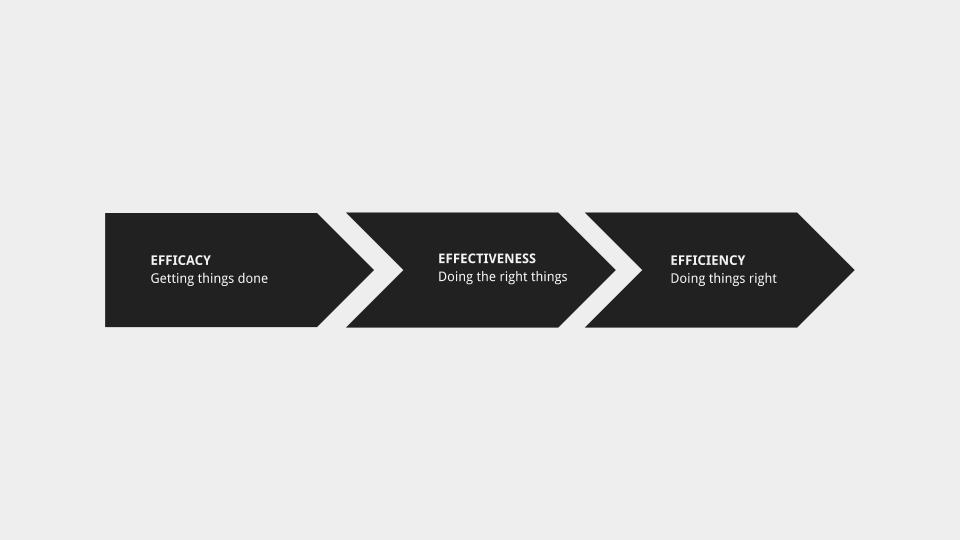Efficacy, effectiveness, efficiency… These terms sound confusingly similar. Commonly used in medical research, project management, and decision science, they are often mixed up in everyday conversations. If you’re in a hurry, here’s the difference:
- Efficacy means getting things done
- Effectiveness means doing the right things
- Efficiency means doing things right
Sounds confusing? Don’t worry, I felt the same before I looked into it. Let’s go through each of these terms one by one, and you’ll understand the difference, and why it matters.

Efficacy means getting things done
The word “efficacy” is mostly used in a scientific setting. Asking about the efficacy of an intervention is asking whether it can achieve the desired result, even if that’s under very specific and controlled conditions. Efficacy is the ability to create the expected effect.
For instance, a medication may be able to improve a patient’s symptoms in an ideal environment, where they are closely monitored so they stick perfectly to the prescription. If that’s the case, the drug has demonstrated efficacy. Yes, you may need a very specific protocol, but if you do, the medication does get the thing done (where “the thing” is improving a patient’s symptoms).
As Dr Enrique Burches and Dr Marta Burches explain: “Efficacy, in the healthcare sector, is the capacity for beneficial change (or therapeutic effect) of a given intervention (for example a drug, medical device, surgical procedure or a public health intervention) under ideal or controlled conditions.” Because it is a highly specific measure which makes little sense in everyday situations, you will rarely hear the term efficacy outside of pharmacological and clinical trials.
Effectiveness means doing the right things
But getting things done is not necessarily enough. A drug that improves a patient’s symptoms under perfect conditions is technically getting things done, but is it getting the right things done?
For instance, you may create a treatment for diabetes with high efficacy, where the patient needs to stay plugged to a machine twenty-four hours a day for six months, under close supervision from a medical team. After six months of treatment, you measure a noticeable improvement. Sure, the treatment demonstrates efficacy—it’s getting things done—but if your goal is to realistically treat people with diabetes, you wouldn’t be able to call it effective—it’s not getting the right things done.
In clinical trials, effectiveness trials are about how well a treatment works in the real world, outside of the perfectly controlled conditions of efficacy trials. “Intervention studies can be placed on a continuum, with a progression from efficacy trials to effectiveness trials. Efficacy can be defined as the performance of an intervention under ideal and controlled circumstances, whereas effectiveness refers to its performance under ‘real-world’ conditions. However, the distinction between the two types of trial is a continuum rather than a dichotomy, as it is likely impossible to perform a pure efficacy study or pure effectiveness study,” explain Dr Amit Singal, Dr Peter Higgins, and Dr Akbar Waljee.
The concept of efficacy versus effectiveness can also be helpful when thinking about other areas of our lives, such as project management and decision making in general. An idea that seems perfect under ideal conditions may not stand the test of chaos which real life inevitably brings about. When choosing between two solutions with similar levels of efficacy, it makes sense to go with the most effective one.
Efficiency means doing things right
Once you have found an effective solution, you can then try to improve it by making it more efficient. The Oxford Dictionary offers several definitions of efficiency. The first one is useless: “The state or quality of being efficient.” The second one—the technical definition—is much more interesting. It defines efficiency as “the ratio of the useful work performed by a machine or in a process to the total energy expended or heat taken in.”
Measuring efficiency is comparing a solution’s input to its output. You could effectively get the right things done, but in an inefficient manner. Efficiency is about doing things in the most economical way, whether in terms of time, energy, or money.
In clinical trials, two drugs could be equally effective: they both manage to improve patients’ symptoms in the real world. However, if one of them is much more costly than the other one, that drug won’t be considered as efficient. Similarly, in project management or decision making, you could come up with a solution that achieves the right result (effective), but is needlessly costly (inefficient).
In his book The Tipping Point, Malcolm Gladwell describes a modest yet incredibly efficient healthcare solution: “The Band-Aid is an inexpensive, convenient, and remarkably versatile solution to an astonishing array of problems. In their history, Band-Aids have probably allowed millions of people to keep working or playing tennis or cooking or walking when they would otherwise have had to stop. The Band-Aid solution is actually the best kind of solution because it involves solving a problem with the minimum amount of effort and time and cost.”
To summarise: efficacy means getting things done (is it working?), effectiveness means doing the right things (is it actually working well?), and efficiency means doing things right (is it working in the most economical way?). It’s helpful to think of them in this particular order. First, make sure the solution can actually achieve the desired result, even if that efficacy requires very specific conditions. Then, test your solution in a real-world environment. Finally, if the solution is effective, figure out ways to make it more economical—more efficient.
